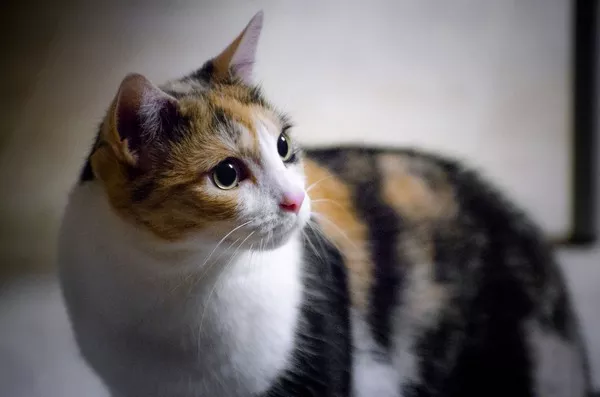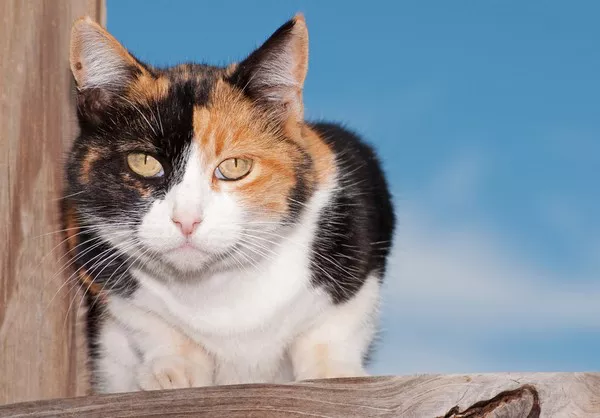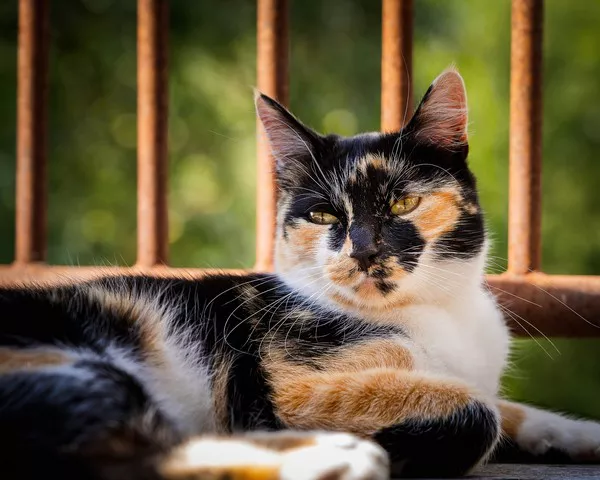Calico cats, with their distinctive tricolor coats, captivate cat enthusiasts worldwide with their charm and unique aesthetics. While these felines boast an array of genetic variations that contribute to their captivating appearance, it’s essential for cat owners to be aware of potential health concerns that calico cats may be prone to. In this comprehensive exploration, we delve into the spectrum of diseases that could affect calico cats. Understanding these potential health issues allows cat owners to be proactive in their care, ensuring the longevity and well-being of these beloved tricolored companions.
The Genetics Behind the Coat
The striking tricolor coat of calico cats is intricately tied to their genetics. Calico patterns are often linked to the presence of two X chromosomes, a characteristic unique to female cats. The interplay of colors in their coat is a result of genetic factors, and while the coat itself doesn’t directly impact their health, the genes responsible for the distinctive coloring may contribute to certain health predispositions.
1. Feline Lower Urinary Tract Disease (FLUTD):
Urinary tract issues, collectively referred to as Feline Lower Urinary Tract Disease (FLUTD), can affect calico cats. These conditions may include urinary tract infections, bladder stones, or feline idiopathic cystitis. The predisposition to FLUTD in calico cats may be influenced by genetic factors, making it crucial for cat owners to be vigilant about their cat’s urinary health.
2. Kidney Disease:
Chronic kidney disease is a common concern in domestic cats, and calico cats may be susceptible to this condition. The kidneys play a vital role in filtering waste and maintaining hydration. Regular veterinary check-ups that include kidney function assessments are essential to detect and manage kidney disease in its early stages.
3. Obesity:
Calico cats, like many other feline breeds, may be prone to obesity. This can be influenced by genetic factors, feeding habits, and lifestyle. Obesity can lead to various health issues, including diabetes, arthritis, and cardiovascular problems. Maintaining a balanced diet and encouraging regular exercise are essential components of preventing and managing obesity in calico cats.
4. Diabetes Mellitus:
Calico cats may have a genetic predisposition to diabetes mellitus. This condition results from the body’s inability to regulate blood sugar levels effectively. Monitoring a calico cat‘s weight, providing a well-balanced diet, and seeking veterinary guidance can contribute to the prevention and management of diabetes.
5. Hypertrophic Cardiomyopathy (HCM):
Hypertrophic Cardiomyopathy (HCM) is a common heart condition in cats, characterized by the thickening of the heart muscle. While HCM can affect cats of any breed, calico cats may be susceptible to genetic factors that influence heart health. Regular veterinary check-ups, including cardiac assessments, are crucial for early detection and management of HCM.
6. Cancer:
Cancer can affect cats, including calico cats, and may manifest in various forms, such as lymphoma, mammary tumors, or skin cancers. Genetic factors can contribute to the susceptibility of certain types of cancer. Routine veterinary examinations, awareness of changes in behavior or physical appearance, and preventive measures such as spaying (for female cats) can aid in the early detection and management of cancer.
7. Inflammatory Bowel Disease (IBD):
Inflammatory Bowel Disease (IBD) is a condition characterized by chronic inflammation of the gastrointestinal tract. Calico cats may have a predisposition to IBD, which can lead to symptoms such as vomiting, diarrhea, and weight loss. Dietary management, along with veterinary guidance, is crucial for addressing and managing IBD in calico cats.
8. Allergies:
Calico cats, like other feline breeds, may be prone to allergies. Allergic reactions can manifest in various ways, including skin irritation, gastrointestinal issues, or respiratory symptoms. Identifying and addressing potential allergens, such as certain foods or environmental factors, is essential for managing allergies in calico cats.
9. Joint and Bone Issues:
Calico cats, particularly those with specific genetic traits, may be susceptible to joint and bone issues, such as arthritis. Maintaining a healthy weight, providing appropriate nutrition, and considering joint supplements under veterinary guidance can contribute to the overall joint health of calico cats.
10. Dental Problems:
Dental issues, including periodontal disease and gingivitis, can affect calico cats. Genetics, along with dental care practices, play a role in oral health. Regular dental examinations, tooth brushing, and providing dental treats or toys can contribute to maintaining healthy teeth and gums.
11. Hyperthyroidism:
Hyperthyroidism is a condition characterized by an overactive thyroid gland, leading to an excess production of thyroid hormones. Calico cats may have a genetic predisposition to hyperthyroidism. Regular thyroid screenings and veterinary consultations are essential for early detection and management of this condition.
12. Respiratory Issues:
Calico cats, like some other breeds, may be prone to respiratory issues such as asthma. Genetic factors, along with environmental influences, can contribute to respiratory conditions. Monitoring for signs of respiratory distress and seeking prompt veterinary care are essential for managing respiratory issues in calico cats.
13. Neurological Disorders:
Certain genetic factors in calico cats may be associated with an increased risk of neurological disorders. These disorders can manifest in various ways, including seizures or abnormal behaviors. Consultation with a veterinarian and, if necessary, a veterinary neurologist is crucial for diagnosing and managing neurological conditions.
14. Feline Infectious Peritonitis (FIP):
Feline Infectious Peritonitis (FIP) is a viral disease that can affect cats, including calico cats. While not exclusive to any particular breed, genetic factors may influence susceptibility. FIP is a complex disease, and veterinary guidance is essential for diagnosis and management.
15. Hemophilia:
Calico cats, particularly those with specific genetic traits, may be at a higher risk of hemophilia—a disorder that impairs blood clotting. While relatively rare, it’s crucial to be aware of potential genetic predispositions and seek veterinary care promptly for any signs of bleeding or clotting issues.
16. Eye Conditions:
Calico cats may be prone to certain eye conditions, including congenital issues or conditions that develop later in life. Regular eye examinations, along with prompt veterinary attention for any signs of discomfort or changes in eye appearance, are essential for maintaining ocular health.
17. Reproductive System Issues:
Female calico cats, in particular, may be susceptible to reproductive system issues, such as uterine infections or complications related to breeding. Spaying or neutering, performed under veterinary guidance, can mitigate many reproductive health concerns.
18. Liver Disease:
Liver disease can affect cats, including calico cats, and may be influenced by genetic factors. Regular veterinary check-ups, monitoring for signs of liver dysfunction, and maintaining a balanced diet are essential for supporting liver health.
19. Immune-Mediated Diseases:
Calico cats may be predisposed to certain immune-mediated diseases, where the immune system mistakenly attacks healthy cells. These conditions can manifest in various ways, and veterinary consultation is crucial for accurate diagnosis and management.
Conclusion
In conclusion, calico cats, with their captivating tricolor coats, may be susceptible to a range of health concerns influenced by genetic factors. Understanding the potential diseases that calico cats may be prone to allows cat owners to take proactive measures in their care. Regular veterinary check-ups, a balanced diet, preventive measures, and prompt attention to any signs of illness are essential components of maintaining the health and well-being of these beloved tricolored feline companions.
By fostering a strong partnership with veterinary professionals and staying informed about the unique health considerations of calico cats, owners can ensure that their feline friends lead happy, healthy, and fulfilling lives. The beauty of a calico cat extends beyond its exterior, encompassing the need for attentive and proactive healthcare to nurture the enduring bond between these captivating felines and their human companions.


























